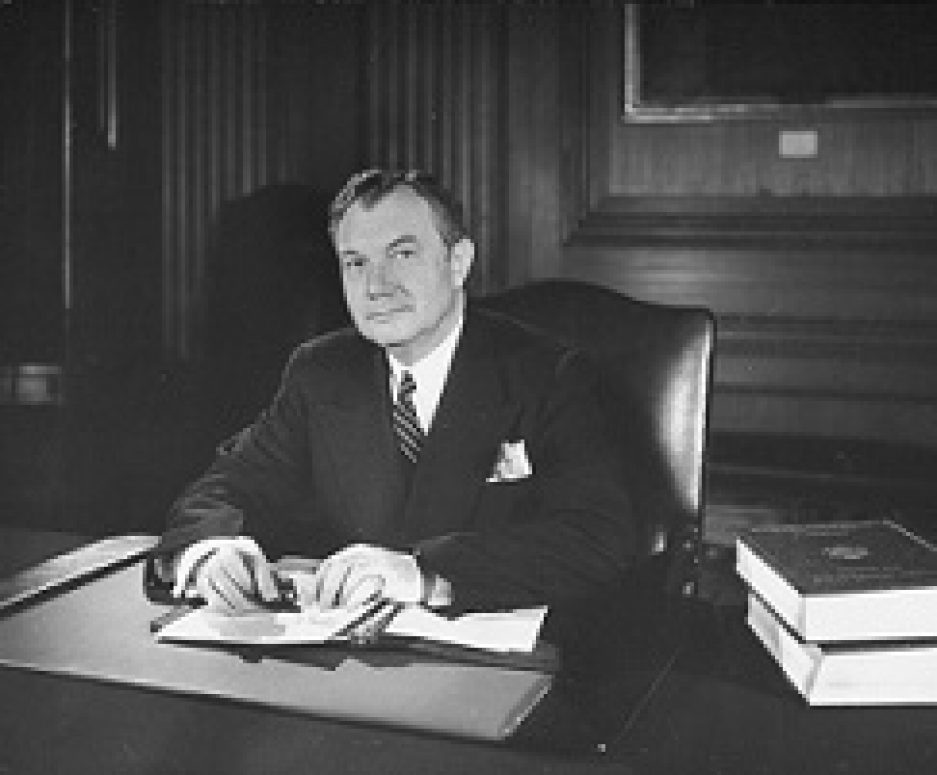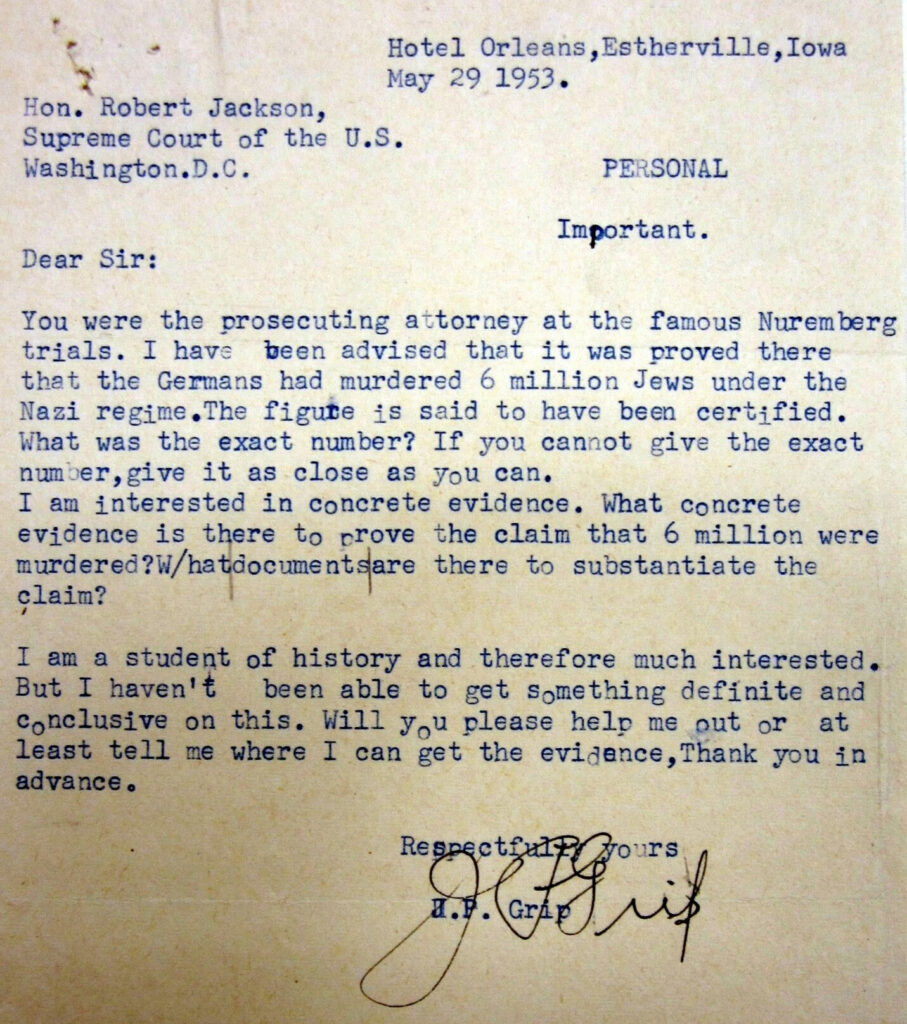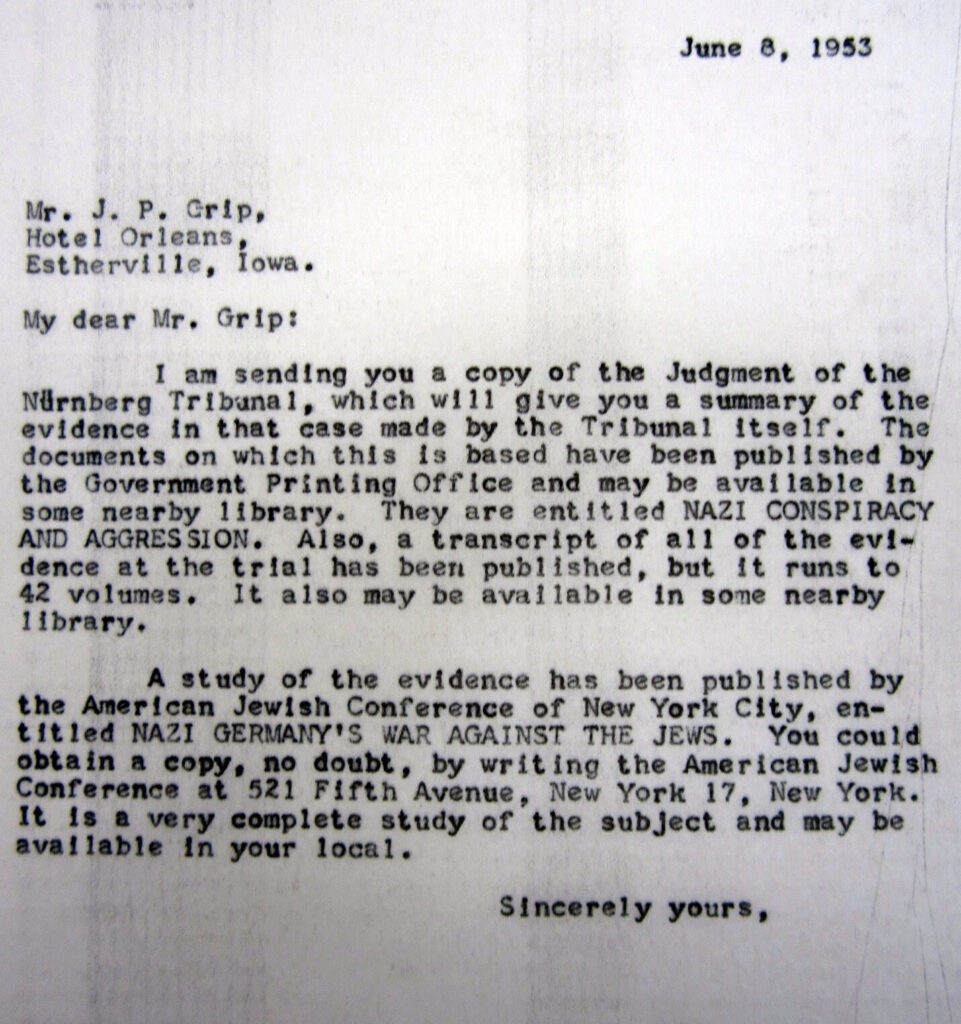Tonight marks the start of Yom Hashoah, the international Holocaust Remembrance Day. It remembers the approximately 6,000,000 Jews murdered by Nazi Germany and its collaborators, and it remembers Jewish resistance in that time.
The date of Yom Hashoah is the 27th day of the month of Nisan on the Hebrew calendar. In Hebrew calendar year 5704, the 27th day of Nisan was April 19, 1943, on the Gregorian calendar (the 365-day solar year). That was the date of the Warsaw ghetto uprising—the date on which Polish Jews, imprisoned by Nazi occupiers in a ghetto in Warsaw and facing extermination, chose heroically to fight, even to the death.
In Spring 1943, Robert H. Jackson was in his third year of service as an associate justice of the Supreme Court of the United States.
Justice Jackson likely knew from newspapers, radio, and personal contacts some of what was happening to Jews in Europe, including in Warsaw.
On April 13, for example, the New York Times reported on an international relief organization’s new report. It detailed that Jews in Warsaw were incarcerated behind nine-foot high walls and barbed wire; that the ghetto population had been reduced from 500,000 to 40,000; that “hunger typhus” was raging; that people were starving; and that the organization had given up on Polish Jews as “hopelessly lost.”
On April 14, the Washington Post editorialized that the Nazis had already killed two million of Europe’s Jews. It wrote that millions of others, “herded in ghettos that are only enlarged lethal chambers and in concentration camps,” also were facing death.
Justice Jackson showed in judicial writings his awareness, perhaps only partial, of these events. That spring, he was preparing for the Court to hear oral arguments in cases where Japanese-Americans were challenging the constitutionality of criminal convictions for violating U.S. Army curfew and area-exclusion orders that applied only to Japanese-Americans. When Jackson drafted an opinion (which he ultimately did not file) in Hirabayashi v. United States, in which the Court unanimously upheld a curfew-violation conviction, he penned, I think conspicuously, the word “ghetto.”
In April 1943, Justice Jackson was drafting and editing what became his famous opinion for the Court in the no-compelled-flag-salute case, West Virginia State Board of Education v. Barnette. It includes this paragraph:
Struggles to coerce uniformity of sentiment in support of some end thought essential to their time and country have been waged by many good as well as by evil men. Nationalism is a relatively recent phenomenon but at other times and places the ends have been racial or territorial security, support of a dynasty or regime, and particular plans for saving souls. As first and moderate methods to attain unity have failed, those bent on its accomplishment must resort to an ever-increasing severity. As governmental pressure toward unity becomes greater, so strife becomes more bitter as to whose unity it shall be. Probably no deeper division of our people could proceed from any provocation than from finding it necessary to choose what doctrine and whose program public educational officials shall compel youth to unite in embracing. Ultimate futility of such attempts to compel coherence is the lesson of every such effort from the Roman drive to stamp out Christianity as a disturber of its pagan unity, the Inquisition, as a means to religious and dynastic unity, the Siberian exiles as a means to Russian unity, down to the fast failing efforts of our present totalitarian enemies. Those who begin coercive elimination of dissent soon find themselves exterminating dissenters. Compulsory unification of opinion achieves only the unanimity of the graveyard.
“Present totalitarian enemies…”
“Exterminating…”
“The graveyard….”
These words show that Justice Jackson saw Barnette as about much more than U.S. officials attempting to coerce Jehovah’s Witness schoolchildren to state government orthodoxy (the Pledge of Allegiance) in violations of their consciences.
Two years later, President Truman appointed Justice Jackson to serve as U.S. chief of counsel for the war crimes prosecutions of surviving Nazi leaders. This assignment became the 1945-1946 Nuremberg trial, where Jackson served as U.S. chief prosecutor.
The Nuremberg trial focused on Nazi Germany’s military aggression—on the defendants’ starting and waging World War II.
But the Nuremberg trial also, over many months of public proceedings, established with Nazi documents and witness testimony what we know as the Holocaust—the Nazis’ planned, systematic extermination of 6,000,000 Jews in Europe.
Justice Jackson did not fully comprehend these crimes when his Nuremberg work began. But he and colleagues uncovered and tried to fathom them, then proved them in court, and then left to history as Nuremberg’s evidentiary record this horror that is undeniable—this horror that is proven.
Jackson stated these facts in many ways at Nuremberg, including in his opening and closing statements at the trial.
Justice Jackson also stated these facts and continued to try to teach this awful reality throughout his remaining life.
One glimpse is this exchange, preserved in his correspondence files. In May 1953, a Mr. J.P. Grip, a stranger to Justice Jackson, wrote to him from Estherville, a small city in northern Iowa. He wrote to Jackson as the former Nuremberg prosecutor. Mr. Grip asked Justice Jackson for evidence that the Nazis had murdered 6,000,000 Jews.
Justice Jackson, who at that time was busy doing his share of the Supreme Court’s work as its term was about to end and also dealing with serious health problems, immediately dictated and sent a letter back to Mr. Grip. He sent him a copy of the Nuremberg court judgment. He directed him to the published, vast Nuremberg trial record. And he pointed him to the American Jewish Conference and its authoritative publication (assembled and written by Seymour Krieger, who had been a prosecutor on Jackson’s Nuremberg staff) on the Holocaust.
Yom Hashoah is to remember lives and to teach facts. Please just keep doing that.


